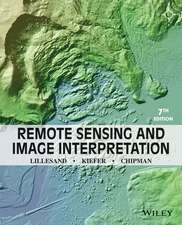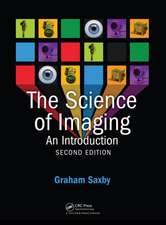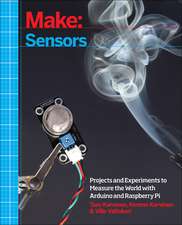A Biologically Inspired CMOS Image Sensor: Studies in Computational Intelligence, cartea 461
Autor Mukul Sarkar, Albert Theuwissenen Limba Engleză Paperback – 29 ian 2015
The CMOS metal layer is used to create an embedded micro-polarizer able to sense polarization information. This polarization information is shown to be useful in applications like real time material classification and autonomous agent navigation. Further the sensor is equipped with in pixel analog and digital memories which allow variation of the dynamic range and in-pixel binarization in real time. The binary output of the pixel tries to replicate the flickering effect of the insect’s eye to detect smallest possible motion based on the change in state. An inbuilt counter counts the changes in states for each row to estimate the direction of the motion. The chip consists of an array of 128x128 pixels, it occupies an area of 5 x 4 mm2 and it has been designed and fabricated in an 180nm CMOS CIS process from UMC.
| Toate formatele și edițiile | Preț | Express |
|---|---|---|
| Paperback (1) | 985.68 lei 43-57 zile | |
| Springer Berlin, Heidelberg – 29 ian 2015 | 985.68 lei 43-57 zile | |
| Hardback (1) | 989.96 lei 43-57 zile | |
| Springer Berlin, Heidelberg – 14 dec 2012 | 989.96 lei 43-57 zile |
Din seria Studies in Computational Intelligence
- 20%
 Preț: 449.37 lei
Preț: 449.37 lei - 20%
 Preț: 1158.26 lei
Preț: 1158.26 lei - 20%
 Preț: 986.66 lei
Preț: 986.66 lei - 20%
 Preț: 1452.76 lei
Preț: 1452.76 lei - 20%
 Preț: 168.78 lei
Preț: 168.78 lei - 18%
 Preț: 1112.30 lei
Preț: 1112.30 lei - 20%
 Preț: 565.38 lei
Preț: 565.38 lei - 20%
 Preț: 649.28 lei
Preț: 649.28 lei - 20%
 Preț: 1047.73 lei
Preț: 1047.73 lei - 20%
 Preț: 1578.96 lei
Preț: 1578.96 lei - 20%
 Preț: 643.50 lei
Preț: 643.50 lei - 20%
 Preț: 657.49 lei
Preț: 657.49 lei - 20%
 Preț: 993.28 lei
Preț: 993.28 lei - 20%
 Preț: 990.80 lei
Preț: 990.80 lei - 20%
 Preț: 989.96 lei
Preț: 989.96 lei - 20%
 Preț: 1165.69 lei
Preț: 1165.69 lei - 20%
 Preț: 1444.52 lei
Preț: 1444.52 lei - 20%
 Preț: 1041.96 lei
Preț: 1041.96 lei - 20%
 Preț: 1047.73 lei
Preț: 1047.73 lei - 20%
 Preț: 1046.06 lei
Preț: 1046.06 lei - 18%
 Preț: 2500.50 lei
Preț: 2500.50 lei - 20%
 Preț: 989.13 lei
Preț: 989.13 lei - 20%
 Preț: 1165.69 lei
Preț: 1165.69 lei - 20%
 Preț: 1164.05 lei
Preț: 1164.05 lei - 20%
 Preț: 1042.79 lei
Preț: 1042.79 lei - 20%
 Preț: 1460.19 lei
Preț: 1460.19 lei - 18%
 Preț: 1403.52 lei
Preț: 1403.52 lei - 18%
 Preț: 1124.92 lei
Preț: 1124.92 lei - 20%
 Preț: 1039.47 lei
Preț: 1039.47 lei - 20%
 Preț: 1008.11 lei
Preț: 1008.11 lei - 20%
 Preț: 1045.25 lei
Preț: 1045.25 lei - 20%
 Preț: 1275.42 lei
Preț: 1275.42 lei - 20%
 Preț: 1040.32 lei
Preț: 1040.32 lei - 20%
 Preț: 988.32 lei
Preț: 988.32 lei - 20%
 Preț: 1169.79 lei
Preț: 1169.79 lei - 20%
 Preț: 1162.37 lei
Preț: 1162.37 lei - 20%
 Preț: 1059.26 lei
Preț: 1059.26 lei - 20%
 Preț: 1164.05 lei
Preț: 1164.05 lei - 20%
 Preț: 1166.52 lei
Preț: 1166.52 lei - 20%
 Preț: 1459.38 lei
Preț: 1459.38 lei - 18%
 Preț: 1005.74 lei
Preț: 1005.74 lei - 20%
 Preț: 997.38 lei
Preț: 997.38 lei - 20%
 Preț: 1055.94 lei
Preț: 1055.94 lei - 20%
 Preț: 1284.47 lei
Preț: 1284.47 lei - 20%
 Preț: 994.08 lei
Preț: 994.08 lei - 20%
 Preț: 1048.72 lei
Preț: 1048.72 lei - 20%
 Preț: 1066.02 lei
Preț: 1066.02 lei - 20%
 Preț: 943.78 lei
Preț: 943.78 lei - 20%
 Preț: 1173.10 lei
Preț: 1173.10 lei - 20%
 Preț: 1457.72 lei
Preț: 1457.72 lei
Preț: 985.68 lei
Preț vechi: 1232.10 lei
-20% Nou
Puncte Express: 1479
Preț estimativ în valută:
188.60€ • 197.45$ • 156.06£
188.60€ • 197.45$ • 156.06£
Carte tipărită la comandă
Livrare economică 07-21 aprilie
Preluare comenzi: 021 569.72.76
Specificații
ISBN-13: 9783642444791
ISBN-10: 3642444792
Pagini: 258
Ilustrații: X, 258 p.
Dimensiuni: 155 x 235 x 14 mm
Greutate: 0.38 kg
Ediția:2013
Editura: Springer Berlin, Heidelberg
Colecția Springer
Seria Studies in Computational Intelligence
Locul publicării:Berlin, Heidelberg, Germany
ISBN-10: 3642444792
Pagini: 258
Ilustrații: X, 258 p.
Dimensiuni: 155 x 235 x 14 mm
Greutate: 0.38 kg
Ediția:2013
Editura: Springer Berlin, Heidelberg
Colecția Springer
Seria Studies in Computational Intelligence
Locul publicării:Berlin, Heidelberg, Germany
Public țintă
ResearchCuprins
Natural and artificial compound eye.- Design of a CMOS image sensor.- Design of a CMOS polarization sensor.- Material classification using CMOS polarization sensor.- Navigation using CMOS polarization sensor.- Motion detection and digital polarization.- Future works.
Textul de pe ultima copertă
Biological systems are a source of inspiration in the development of small autonomous sensor nodes. The two major types of optical vision systems found in nature are the single aperture human eye and the compound eye of insects. The latter are among the most compact and smallest vision sensors. The eye is a compound of individual lenses with their own photoreceptor arrays. The visual system of insects allows them to fly with a limited intelligence and brain processing power. A CMOS image sensor replicating the perception of vision in insects is discussed and designed in this book for industrial (machine vision) and medical applications.
The CMOS metal layer is used to create an embedded micro-polarizer able to sense polarization information. This polarization information is shown to be useful in applications like real time material classification and autonomous agent navigation. Further the sensor is equipped with in pixel analog and digital memories which allow variation of the dynamic range and in-pixel binarization in real time. The binary output of the pixel tries to replicate the flickering effect of the insect’s eye to detect smallest possible motion based on the change in state. An inbuilt counter counts the changes in states for each row to estimate the direction of the motion. The chip consists of an array of 128x128 pixels, it occupies an area of 5 x 4 mm2 and it has been designed and fabricated in an 180nm CMOS CIS process from UMC.
The CMOS metal layer is used to create an embedded micro-polarizer able to sense polarization information. This polarization information is shown to be useful in applications like real time material classification and autonomous agent navigation. Further the sensor is equipped with in pixel analog and digital memories which allow variation of the dynamic range and in-pixel binarization in real time. The binary output of the pixel tries to replicate the flickering effect of the insect’s eye to detect smallest possible motion based on the change in state. An inbuilt counter counts the changes in states for each row to estimate the direction of the motion. The chip consists of an array of 128x128 pixels, it occupies an area of 5 x 4 mm2 and it has been designed and fabricated in an 180nm CMOS CIS process from UMC.
Caracteristici
Latest research on Polarization Vision Detection using a CMOS Image Sensor Presents an example of a Biologically Inspired CMOS Image Sensor Written by leading experts in the field











